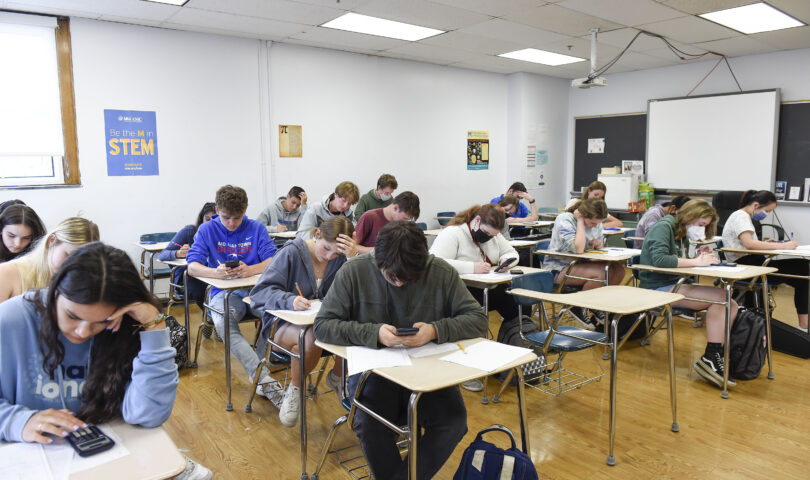By this time of the year, your average high school student usually has all the angles figured out.
In math teacher Brian Jackson’s classroom at Morgantown High School on Tuesday afternoon, that was even more so.
Especially since a lot of these students were members of Mu Alpha Theta, the math honorary, while taking Advanced Placement classes in other subjects, besides.
“Yeah, they’re pretty much on the upper tier, mathematically,” the teacher said.
Tuesday, they were also hoping to be among the nation’s best in the surveying game.
Chances are, you’ve seen a lot of surveyors in your time.
You know who they are, even if you aren’t exactly sure what they’re doing, with that tripod and viewing device (slightly futuristic) that they’re squinting through, to map it all out.
Mapping is the word.
Using math and science, they’re taking fixed points, and mapping the terrestrial or three-dimensional points between them, using angles and distance.
It’s like employing a surveyor to make sure the boundaries to your house match up with what’s on file at the courthouse.
That’s important, if you want to tack on an addition or dig out for a swimming pool.
You need to know, exactly and precisely, where your property line is, in relation to your neighbor’s.
And even though some of it looks futuristic, its practitioners are using a lot of the same techniques and equipment wielded by George Washington — yes, that George Washington — who just might be America’s best-known surveyor.
Back to Jackson’s classroom, students were scribbling out the Calculus and other numerical avenues surveyors deploy daily, as part of a timed test that might bring them to the borders of national recognition someday.
It was all part of Trig-Star, an annual high school mathematics competition hosted by National Society of Professional Surveyors in Frederick, Md.
Triad Engineering, a firm that provides surveying and other consulting services to the region from its headquarters in Morgantown, was the local sponsor.
“It’s about getting young people interested in careers in math,” said Kevin Brockett, Triad’s surveying manager. “And surveying is a pretty interesting profession.”
The top student in the MHS competition could qualify for the national TRIG-STAR contest, Brockett said.
“Each state will have winner,” he said.
In Jackson’s classroom, students were bent over paper, navigating the numerical mazes of surveying, only without the aid of the viewing devices to set the angles.
No textbooks, tablets or Wi-Fi intervention, either.
Calculators were allowed, but not those whiz-bang programmable ones.
Brockett likes the intellectual, mathematical purity of the test — which was precisely timed to 60 minutes.
He also like the idea that students might cross over the border to surveying, which is what happened to him in college.
“I wasn’t even thinking about this,” he said. “Then I took a class.”
Jackson, meanwhile, thinks about math all the time. He was in second grade back home in New Martinsville when he discovered he was pretty good at it.
AP kids make the teaching of his chosen subject easy, he said.
The challenge comes in when during the general classes. That’s when “I’m not a math person” malaise stacks up, he said, much in the manner of those multiplication tables your grandparents had to memorize in grade school.
“It’s my job,” he said, “to make them realize they can be a ‘math person.’”
Or, to at least get them through the class with a good grade.
As the math teacher said: There’s nothing like adding to a student’s self-esteem.
TWEET @DominionPostWV




